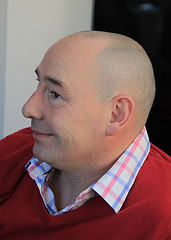
flickr.com/photo_magic_allan
At any given time, an estimate of 10% of the hair is in the resting phrase. Two or three months later, the resting hair will fall out and new hair will start to grow in its place. This growing stage lasts anywhere from two to six years. On average, during this phase, each hair strand grows one centimeter per month. At any given time, ninety percent of the hair is in the growing phase. It is common for a person to lose some hair each day during this cycle.
However, some people may lose hair at a higher than average rate. This can affect anyone, women, men, and children during any stage in their life. There are a variety of reasons that can result in excessive hair loss. Some individuals suddenly lose considerable amounts of hair approximately three to four months following a major surgery. This usually happens as a result of the stress of their illness and is normally temporary. However, it can be upsetting and devastating for the person losing their hair. Hormone-related concerns may also cause hair loss. As a result of an under-active or overactive thyroid gland, hair may fall out. This can usually be supervised by controlling the thyroid disease with medication.
Hair loss can also be caused by a hormonal imbalance of female estrogens or male androgens. Resulting hair loss can be managed by treating the imbalance. It is also quite normal for hair loss approximately three months following the delivery of a baby. This hair loss is a consequence from hormonal changes occurring in her body. When a woman is expectant, she produces elevated hormone levels that enable her body to retain hair that would normally fall out. Once the hormones have returned to the pre-pregnancy levels, the hair begins to fall out again and the body resumes usual hair growth and loss cycles.
Certain drugs can lead to hair loss. Once the offending medication is stopped, people often find their hair loss ceases. Medications such as blood thinners or anticoagulants, chemotherapy medications, medicines for treating gout, antidepressants, excessive amounts of vitamin A, and birth control pills all can lead to hair loss. Certain infections can also result to hair loss. One example is ordinary fungal infections of the scalp in children. These kinds of infections can be easily treated with antifungal medications and the growth soon reoccurs. Particular diseases like lupus or diabetes can also cause hair loss. Hair loss is often considered to be a warning indicator for a disorder. Therefore, it is important to determine and treat the origin.
Rude hair care can also cause hair loss. Hairstyles like cornrows or pigtails, and tight rollers all pull at the hair causing a condition called traction alopecia. This condition, however, can be prevented if the pulling is discontinued prior to causing scalp scarring. It is important to know that scarring can result in permanent hair loss. Chemicals and hot oil treatments used in permanent waves also cause the hair follicle to swell, which can result in scarring and therefore, permanent hair loss.
Tagged with: falling hair • hair loss problem
Filed under: Hair Loss